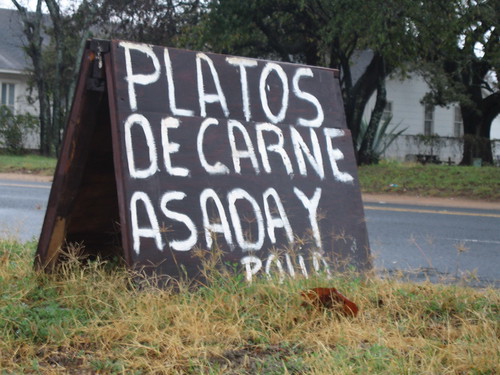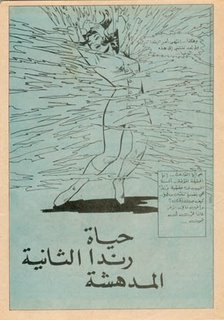Thursday, December 28, 2006
Saturday, December 23, 2006
Oh, Austin
How I missed your skyline.
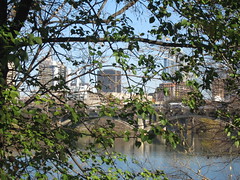
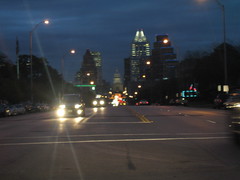
And your migas.
And your schtick.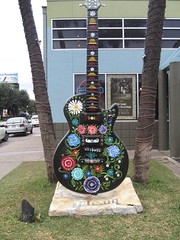
And el chilito's.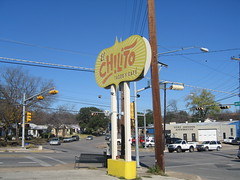
But you have grown too much over the past 4 months. It scares me. I see you changing. I wish you wouldn't change so fast. You even have new bamboo trees by the lake.

Like all the other growth, it's sort of pretty, it's new, but it's not you.


And your migas.

And your schtick.

And el chilito's.

But you have grown too much over the past 4 months. It scares me. I see you changing. I wish you wouldn't change so fast. You even have new bamboo trees by the lake.

Like all the other growth, it's sort of pretty, it's new, but it's not you.
Sunday, December 17, 2006
Home for Their Holidays
My child is in NY now, and I'm leaving to Austin soon. I can't wait. Part of me is wondering why I'm waiting so long. I wish I could go tonight.
I'm working on a story for my History of the Short Story class. We imitate stories-- their plot, voice, style, structure, etc.-- and I am imitating Isaac Babel's "Story of My Dovecote" and setting it in Gaza.
Other things on my agenda: reading Flannery O'connor's The Violent Bear It Away for pleasure, not class, and doing something to my hair that involves a hair dye kit from Sally's and a new pair of Barber-grade shears. I'm terrified and thrilled at the prospect of fucking up my tresses. Maybe I'll post photos.
So, In the next week, expect: Pics of Austin. Pics of friends. Musings. Pics.
I'm working on a story for my History of the Short Story class. We imitate stories-- their plot, voice, style, structure, etc.-- and I am imitating Isaac Babel's "Story of My Dovecote" and setting it in Gaza.
Other things on my agenda: reading Flannery O'connor's The Violent Bear It Away for pleasure, not class, and doing something to my hair that involves a hair dye kit from Sally's and a new pair of Barber-grade shears. I'm terrified and thrilled at the prospect of fucking up my tresses. Maybe I'll post photos.
So, In the next week, expect: Pics of Austin. Pics of friends. Musings. Pics.
Wednesday, December 13, 2006
OTHER Arab Artists Collective
I sat in on a presentation by two members of OTHER Arab Artists Collective. It was awesome to see their installations and listen to music they had created specifically for their work. One song began with a traditional melody and ended with a recording of young girl in Sidon in the 1960s singing a song to her brother in Detroit. Tears.
Rola Nashif, one of the artists, has made a short film entitled Detroit Unleaded. Check out the trailer. And go to the collective's website for more info on the artists, and for inspiration.
Rola Nashif, one of the artists, has made a short film entitled Detroit Unleaded. Check out the trailer. And go to the collective's website for more info on the artists, and for inspiration.
Sunday, December 10, 2006
Gordimer on Mahfouz
Nadine Gordimer was in Cairo this week to deliver the first Naguib Mahfouz Memorial Lecture. El-Ahram printed the text of her lecture. She summons the works and ideas of Proust, Camus, Harold Pinter, Milosz, Conrad, Primo Levi, Kafka, and Kundera to address the responsibilities of the writer, and how Mahfouz in particular met his head on. Go here for the entire thing.
Friday, December 08, 2006
New Egyptian MusicFest!!!
From BBC:
Thanks to Selina for link!
Disillusioned with what they see as the low quality, sexualised, commercial pop music available on the Egyptian television and airwaves, a group of young musicians began an ambitious project to share original, underground music and support Egypt's home-grown talent.
The music was highly diverse - rock, metal, reggae, modern Egyptian, rai, contemporary oriental jazz and hip-hop.
The driving force behind the festival is 28-year-old Ousso, a session musician and guitarist in jazz fusion band Eftekasat.
"I decided to create a platform for good music, original music, underground music. Confidence is low in Egypt. People tend to imitate more than innovate," Ousso said.
...
With the support of major sponsors, the event was free for the 15,000 invited fans.
Ousso he is aiming to begin a musical revolution.
Being a young musician in Egypt is a challenge. There are few music schools and teachers.
Getting hold of equipment is difficult, it's hard to find drums or a guitar and even tougher to find a rehearsal studio or a place to play.
Venues are small and thin on the ground and audiences are rarely greater than 400 people.
But you wouldn't know this from the thousands at the SOS festival.
Young families picnicked on the grass; metal fans with piercings head-banged wildly and hijab-wearing young women bounced on the shoulders of friends up against the stage.
Thanks to Selina for link!
Thursday, December 07, 2006
Morning Musings
When I was little, there were things I knew but did not know. Like: my grandfather left the south of Egypt for Alexandria, left his family behind. When I pictured him doing this, I saw his slim body bobbing along the Nile, saw him walking all the way North to Alexandria. My grandmother's family left Greece for Alexandria. She left them for my grandfather, my grandfather who left his family in the South for Alexandria. Then, they had my mother and her brother and sister. My mother left them for my father, my father who left Palestine for Alexandria. (I haven't seen his siblings in over 13 years. My uncle calls me sometimes. He is the one who doesn't really believe in the angel Gabriel. When he told this to my father two summers ago, my father felt like someone dampened a corner in his mind, and since that corner was dark, he can smell always the mildew of his new religious confusion. He is a very impressionable, very sensitive man. Mama does not like sensitivity. Her solution to criticism is to not hear it at all because she talks all the time all the time constantly talks. She and my Baba live far away from their children. They left their children in America the way they left their old families. New families are still families to get away from.) When I was little we would go to Alexandria in the Summer. Once, my great aunty, Tante Munira, came to visit us in Alexandria. She was one of the sisters my grandfather left behind in the south. Great Aunty Tante Munira wore black all the time all the time I never saw her in anything but black. She wore a black scarf on her head too. When she visited her back hunched and she was old and she walked slowly to the balcony. I liked her smell and her hands which were covered in little blue vein railways. Tante Munira sat on our balcony which overlooked the dump and she knitted. The ball of yarn in her lap is black now in my memory, but I don't think it really was a ball of black yarn. Her lap was black. I did not know when I was a child what it was like to go without sex for years and decades, like Tante Munira had done. She sat on our balcony overlooking the dump and knitted from the black yarn in her black lap, and Mama sat across from her, and I sat across from Mama and put my small feet in Mama's lap. Mama leaned in and whispered, "Don't sit with your back to Tante. It's rude." My back felt naked as though small rude clowns were facing Tante Munira and taunting her. I turned my chair around and the scraping noise of the black wooden legs against the white tiles made Tante Munira look up from the black yarn in her black lap and smile at me. Fifteen years later I saw a black and white picture of an old woman all in black with a black scarf on her head. She was so thin. I asked Mama if it was Tante, and she said it was my great-grandma, whom mama's mother had run away from when she was only 17. I am now sitting on an Ottomon in the vast cold balcony of Michigan, and I feel as though my back is turned to everyone who made me, and all the people I once knew.
Wednesday, December 06, 2006
Department of Goose Bumps
From the old-by-now article on Khoury in the LRB:
The narrative of the victim must end; it is a disgusting, opportunistic fable that feeds on everyone who feels a need to tell it, whether from overwhelming strength or profound disadvantage. For a moment, Khaleel thinks of the trains that rattled through Syria and Lebanon depositing Palestinians round the suburbs of the cities, where they would settle in camps for half a century – and counting. The echo of other trains in other places is not a call to rehearse futile arguments about who suffered more – that would be succumbing to the single story again. It is simply an acknowledgment, across the battle lines, that the enemy, too, has a history: ‘The whistle rings in my ears. I see the people being led towards the final train. I see the trains, and I shudder.’Fucking goose bumps. If you haven't read Gate of the Sun yet, or if you've been putting it off, as I have, or if you're so in love with other Khoury books and think this one is too similar/different, stop. Buy it. Read it.
Monday, December 04, 2006
From Sign & Sight:
But this is all wishful thinking, from the ceasefire onwards. It is foolish to imagine that Israel wants the Palestinians to have a true state. Otherwise it would not have spent all its energy building settlements, filling them, and creating highways to connect them and disconnect the very state it pretends the Palestinians should have. And it's also foolish to pretend that the Palestinians are truly able to adhere to a ceasefire, when Israel has not adhered to one in almost 40 years. Until Palestinian land is vacated of checkpoints and occupation, one can be sure there will always be someone fighting back, or someone fighting for power among those who are powerless.

See Also: "An Israeli advocacy group, using maps and figures leaked from inside the government, says that 39 percent of the land held by Israeli settlements in the occupied West Bank is privately owned by Palestinians." (NYT, 11/20/06)
And on You Tube: Peace, Propoganda, and the Promised Land: A documentary about how the media skews our vision of what's really happening in Palestine
Image at left ("Settlements on Privately Owned Palestinian Land) from NYT. Click to Enlarge.
If the ceasefire between the Israelis and Palestinians actually holds, "it could put us on the road to a new start," author Amos Oz writes hopefully, and finally get a comprehensive bilateral agreement on the table. "What measures would such an agreement entail? Herein lies the hope. Because both the Israelis and the Palestinians know, deep in their hearts, what this agreement would look like and what it would not look like. ... Even those on both sides who would view such an agreement as a catastrophic betrayal know that on the cards are two separate states, Israel and Palestine, divided by the pre-1967 boundary, with a few changes that would have to be agreed on. And there would be two capitals in Jerusalem. And there would be no "right to return" for the Palestinians, and the majority of Israeli settlements would also have to be cleared."I would add, since there is no "right to return" for Palestinians, there should be no "right to return" for Jews. And all the Israeli settlements would have to be cleared, every single one, since they are all illegal to begin with.
But this is all wishful thinking, from the ceasefire onwards. It is foolish to imagine that Israel wants the Palestinians to have a true state. Otherwise it would not have spent all its energy building settlements, filling them, and creating highways to connect them and disconnect the very state it pretends the Palestinians should have. And it's also foolish to pretend that the Palestinians are truly able to adhere to a ceasefire, when Israel has not adhered to one in almost 40 years. Until Palestinian land is vacated of checkpoints and occupation, one can be sure there will always be someone fighting back, or someone fighting for power among those who are powerless.

See Also: "An Israeli advocacy group, using maps and figures leaked from inside the government, says that 39 percent of the land held by Israeli settlements in the occupied West Bank is privately owned by Palestinians." (NYT, 11/20/06)
And on You Tube: Peace, Propoganda, and the Promised Land: A documentary about how the media skews our vision of what's really happening in Palestine
Image at left ("Settlements on Privately Owned Palestinian Land) from NYT. Click to Enlarge.
Palestine
I'm getting together an application to go to Ramallah this summer. The goal is to do research for a second novel, partly set in the West Bank, and to find cool poetry/short stories to translate. While there, I'll also volunteer to teach a short creative writing class for children.
I've been thinking a lot lately about all the family I have that I don't stay in contact with, or just haven't seen in 10-15 years because of the fact that I left to the US and never went back to Jordan/Jenin. I miss my uncles and my aunts and my cousins.
Part of being an independent woman-- which for me means, "I can live however I want, be whomever I want, and write whatever I want" -- has translated loosely to "Goodbye, y'all!" Which is really too bad. I grew up seeing what staying in with family did to women-- they didn't divorce people they should have divorced, they didn't follow a dream they wished they could follow-- but in my determination I forgot what they got out of it: a sense of closeness, wholeness, and belonging, things I am sorely lacking. I am feeling that lack right now, especially since I am in a new town, without any of the friends I once relied on to be family.
On top of all that, I just miss Palestine! I miss the way the air smelled at dusk-- like cooking, trees, and burning trash-- and I miss the way people speak to each other. I find myself sometimes turning away from the news-- someone else died? More checkpoints? That wall is no joke?-- and I want to see the sufferning first-hand and write about it.
And I want to share who I've become with my old family, the people who shaped me even if they don't know they did.
I've been thinking a lot lately about all the family I have that I don't stay in contact with, or just haven't seen in 10-15 years because of the fact that I left to the US and never went back to Jordan/Jenin. I miss my uncles and my aunts and my cousins.
Part of being an independent woman-- which for me means, "I can live however I want, be whomever I want, and write whatever I want" -- has translated loosely to "Goodbye, y'all!" Which is really too bad. I grew up seeing what staying in with family did to women-- they didn't divorce people they should have divorced, they didn't follow a dream they wished they could follow-- but in my determination I forgot what they got out of it: a sense of closeness, wholeness, and belonging, things I am sorely lacking. I am feeling that lack right now, especially since I am in a new town, without any of the friends I once relied on to be family.
On top of all that, I just miss Palestine! I miss the way the air smelled at dusk-- like cooking, trees, and burning trash-- and I miss the way people speak to each other. I find myself sometimes turning away from the news-- someone else died? More checkpoints? That wall is no joke?-- and I want to see the sufferning first-hand and write about it.
And I want to share who I've become with my old family, the people who shaped me even if they don't know they did.
